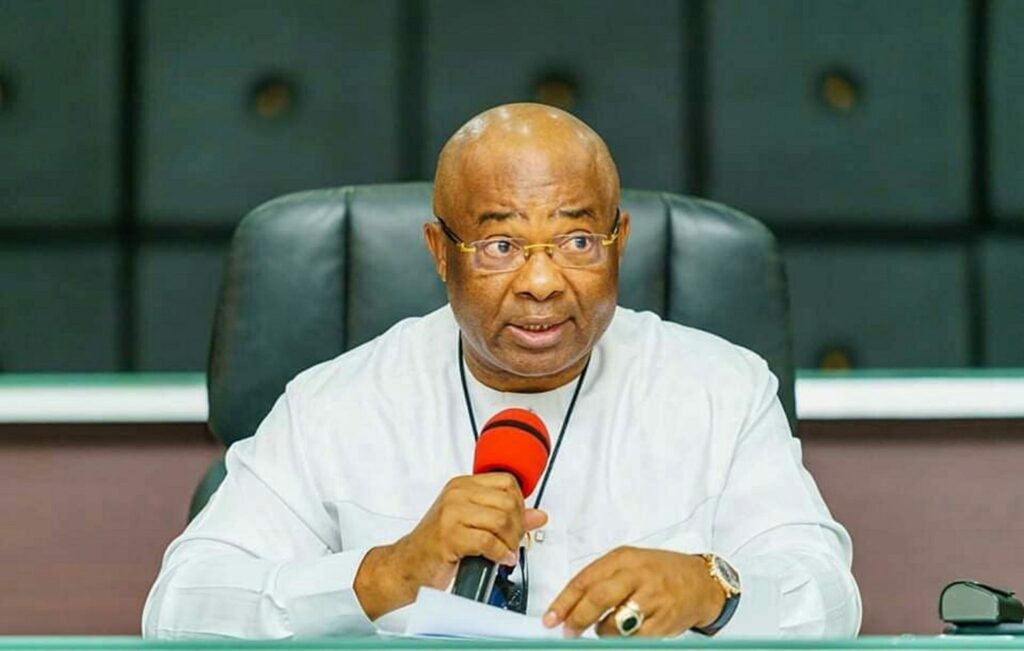Imo Governor Hope Uzodimma on Wednesday unveiled a strategic Master Plan to support SMEs and microbusinesses in order to industrialise the state.
The plan, which aims to encourage economic growth, was developed in collaboration with the UN Industrial Development Organisation (UNIDO) and spearheaded by Prof. Kenneth Amaechi, the governor’s chief economic adviser.
The ultimate goal, according to Uzodimma, who unveiled the policy document at the Sam Mbakwe Exco Chamber of Government House Owerri, is to set the state on the path of a protracted and lasting economic renaissance.
Uzodinma said the industrial policy was carefully articulated to offer fresh, pragmatic, and actionable insights into the quest for the industrialization of the state.
“This industrial policy is a long-term sustainable initiative that will outlive this administration.
“Part of what the Imo industrial policy is set out to achieve is to identify all the economic potentials, take advantage of where we have comparative advantages, and clearly outline how government can help the harnessing of the potentials,” he said.
The governor explained that the road infrastructure, creation of the ministry of the digital economy, and dredging of the Orashi River to link up the Atlantic Ocean were projects aimed at Industrialisation.
“The launch of the Imo industrial policy is not just an initiative to drive the economy but a plan that will guarantee the future of our youths, prolong lives and also assure prosperity,” he said.
The governor also said the initiative was to accelerate job creation, especially for the army of unemployed youths.
Uzodinma said his administration was willing to partner with the private sector through a public-private partnership.
He urged investors to take advantage of the robust friendly investment climate in the state to invest in different sectors of the economy.
“Invest in the digital economy, agro-industry, tourism, oil and gas, mining, fabrication, and allied industries,” the governor appealed.
In his remarks, the Regional Director of UNIDO, Mr. Jean Bakole, said his organization was committed to providing service advisory and support to develop industrial policy.
“The industrial policy is a roadmap which will help the state see exactly where you are, which kind of activity you will like to undertake, and show clearly what next to do.
“The policy also aims to reduce the cost of doing business, promote inclusive and sustainable industrial development, sustainable entrepreneurial opportunities, quality job creation, massive local and foreign investments, and trade surplus,” he added.
Bakole assured the governor that UNIDO would sustain its support for all activities of the policy and as well use its network to attract support and investments.
The chief economic adviser to the governor who presented an overview of the policy said it was focused on clear philosophy based on the principles of relevance, pragmatism, and sustainability.
“We had wide consultations where we discovered that the state economy is based on micro-businesses as well as SMEs.
“We need to protect them and design a kind of policy that will help them grow to be part of the global chain,” he said.
Amaeshi said agro-industry/agribusiness, oil and gas, minerals processing, tourism/hospitality, digital economy, fabrication, and renewable energy remained the emerging key industrialization opportunities in the state.
“We think that these sectors will help us solve the fundamental problems of job creation, wealth, and shared prosperity which is at the heart of this government,” he added.
Amaeshi commended the governor for showing political will that resulted in the policy.
Also speaking, the Director-General of Imo state Investment Promotion Agency, Dr. Jude Nzeako said the policy would enable the governor to intervene and direct investment to areas with comparative advantages.
He said this would enhance treasury management, tax systems, and security and as well stimulate interest in the local government system.
